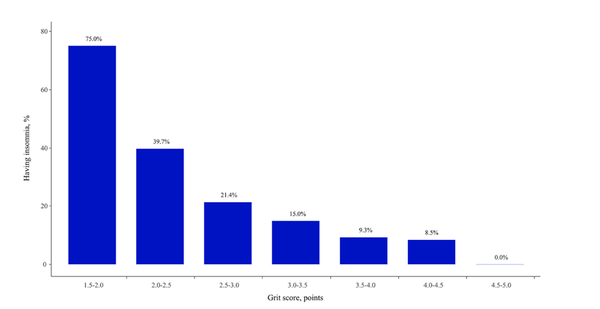Researchers from the Department of Neurology at Seoul National University Bundang Hospital (SNUBH), led by Professors Yun Chang-ho and Kim Jae-rim, have identified that greater grit—a psychological trait characterized by perseverance and passion for long-term goals—is inversely associated with the incidence and severity of insomnia.

Insomnia, a disorder marked by difficulty falling asleep and frequent awakenings, is common, affecting up to one in three adults. If left untreated, it can pose various risks, including mental illness, heart disease, diabetes, and weakened immunity.
Historically, insomnia was treated with medications like sleeping pills. However, in recent years, cognitive behavioral therapy has been recommended as a first-line approach to address the thoughts, behaviors, and habits that disrupt sleep. This shift stems from the limited effectiveness of medication alone and concerns over dependence and tolerance.
In recent years, the core of insomnia treatment has shifted toward gaining a deeper understanding of the individual characteristics that contribute to the condition and offering tailored cognitive behavioral therapy to address them. Psychological traits, in particular, play a crucial role in influencing insomnia, as they can be developed and adjusted. Ongoing research aims to integrate these factors into cognitive behavioral therapy to enhance effectiveness.
The research team conducted a regression analysis of data collected from more than 2,500 people through a nationwide population-based cross-sectional survey to determine the link between grit and insomnia.
Grit is composed of psychological factors including tenacity, boldness, resilience, ambition, and need for achievement. People with higher grit scores are known to be more likely to persevere in the face of setbacks and consistently persist in their efforts to realize their goals.

The findings revealed that the average grit score among all respondents was 3.27 out of 5. Notably, insomnia prevalence was 75 percent in the lowest quartile (scores between 1.5 and 2.0). In contrast, the prevalence decreased significantly in higher quartiles, dropping to 9.3 percent (scores of 3.5 to 4.0), 8.5 percent (scores of 4.0 to 4.5), and 0.0 percent for scores of 4.5 or higher.
Grit scores were also inversely correlated with insomnia severity, with each one-point increase in grit score associated with a 60 percent decrease in the likelihood of reporting insomnia and a 45 percent decrease in the likelihood of experiencing poor sleep quality.
While grit has traditionally been linked to academic and professional success, this study is noteworthy for demonstrating that grit also contributes to better sleep quality and reduced insomnia, SNUBH said.
“Grit, defined as persistence and passion for long-term goals, appears to positively impact insomnia by mitigating factors like depression and enhancing the body’s ability to cope with pressure and stress,” said Professor Yun. “Our findings suggest the importance of evaluating patients’ grit levels when treating insomnia and incorporating interventions to cultivate it.”
The findings were published in Sleep Medicine, the official journal of World Sleep Society.
Related articles
- Migrant workers in Korea face isolation and rising suicide rates
- 1st pediatric insomnia drug launched in Korea
- The impact of stigma and service gaps on mental health in Korea vs US
- A hidden reason for older adults’ insomnia: craving for a good night's sleep
- AI model using sleep-wake patterns predicts mood disorder episodes
- Starting next January, medical bills for depression diagnosis will be covered
- Articulated laparoscopic instruments improve surgical outcomes in colorectal surgery: SNUBH study
- Asleep’s AI-powered sleep apnea screening app now prescribed at SNUBH
- Chronic dizziness tied to stress and depression, study finds, urging rethink in treatment

